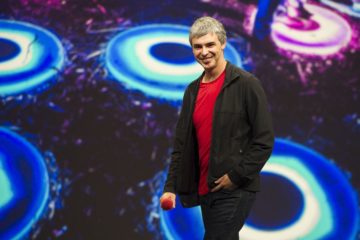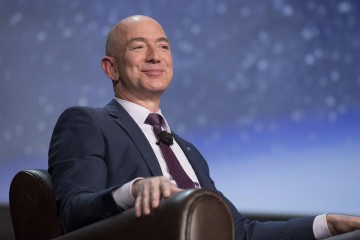Bill Gates Q&A on Climate Change: ‘We Need a Miracle’

©2016 Bloomberg News
O2Z8WR6S972W
(Bloomberg) —
All we need is an energy miracle. No pressure, kids.
So came the call from Bill Gates on Monday evening with the release of his annual letter. It tackles heady subjects with the billionaire’s usual optimistically sober tone. Unlike letters past, Gates aimed this year’s missive at teenagers instead of adults, arguing they’re our best shot at solving the world’s energy crisis.
The genesis of the note was a conversation the Microsoft co-founder and his wife Melinda had with a group of high school students in Kentucky. The students wanted to know what cereals the Gates family preferred and if Bill knows how to dance the Nae Nae. They also wanted to know which superpower Bill and Melinda would pick, and that question struck a particular chord.
The answers to the superpower question—Bill chose more energy, and Melinda chose more time—seem straightforward at first blush. They were the kinds of things that any adult desires. In the letter, however, Gates focuses not on being peppy for a tennis match but instead on the world’s mounting energy crisis. Melinda likewise issues a global call for improvements in gender equality that would give women more time to pursue those things they care about most.
On the energy front, the most crucial part of the letter centers on an equation cooked up by Gates: P x S x E x C = carbon dioxide. He shows that changes to P (the world’s population), S (services used by each person) and E (energy) will not be dramatic enough to get carbon dioxide production down to zero—something that has to happen, according to Gates, to avoid catastrophic consequences to global warming. The factor that matters most is C (carbon dioxide produced by energy).
Gates has talked quite a bit in the past about the need to come up with new energy technology beyond solar, wind, nuclear and all the rest. We’ll need a major development if the world is really going to change its energy equation. In the letter, though, he puts a very fine point on the idea. “In short, we need a miracle,” Gates writes.
When I say “miracle,” I don’t mean something that’s impossible. I’ve seen miracles happen before. The personal computer. The Internet. The polio vaccine. None of them happened by chance. They are the result of research and development and the human capacity to innovate.
In this case, however, time is not on our side. Every day we are releasing more and more CO2 into our atmosphere and making our climate change problem even worse. We need a massive amount of research into thousands of new ideas—even ones that might sound a little crazy—if we want to get to zero emissions by the end of this century.
Ever the optimist, Gates expects just such a miracle to arrive within the next 15 years, and he expects it just might come from one of today’s teenagers.
In the interview below, Gates expounds on his energy ideas and faith in the world’s youth. The letter goes into more detail on that subject as well as Melinda Gates’s thoughts on gender equality.
Why did you aim the letter at the teenage audience?
I think this younger group has a lot of advantages. They will tend to take a long-term view of things. They’re more scientific oriented and more interested in opportunities they can dream about where our generation hasn’t solved the problem, and, therefore, they can take up and surprise everybody by what they are able to do.
With scientific innovation, you see that people in their 20s get a depth of knowledge and a willingness to look at things in a different way. So, I would say it’s likely that if an energy miracle comes in the next 15 years, key participants will be the teenagers of today.
Why are you confident that there will be a breakthrough?
What we need to get that probability up to be very high is to take 12 or so paths to get there. Like carbon capture and sequestration is a path. Nuclear fission is a path. Nuclear fusion is a path. Solar fuels are a path. For every one of those paths, you need about five very diverse groups of scientists who think the other four groups are wrong and crazy.
Throughout history, it seems like we’ve turned to war and competitions with massive prizes to bring about major advances in a field. Where is the motivation to come up with this energy miracle going to come from?
Scientific problems don’t generally just yield at the time someone comes up with a prize or something equivalent. It is true in war that if one country funds research and gets ahead of the other on ballistic targeting or machine guns, they get an advantage. So you will take whatever is on the scientific frontier and try to get an edge by financing that.
In the energy space, there is no equivalent of when JFK said, “Let’s go to the Moon.” At that time, people understood they needed a certain kind of rocket, recovery system and landing system. There was a very straightforward path where the probability of success, given all the new technologies, was like 95 percent. They needed to integrate everything together in a super reliable way.
This is more like the invention of the automobile. You had risk takers working on steam-powered cars and electric cars. Then, there was this dark horse where they were exploding things in these metal boxes called internal combustion. They kept blowing things up, but because of the energy density of gasoline, the private market weighed the relative merits, and two out of three approaches are footnotes in history.
There is a $3 trillion market per year for buying energy that is bigger than any prize anyone can come up with. But the time it takes to develop this technology means you need slightly more patient capital. The normal venture capitalist model that has worked for biotech and worked for software is not quite right here.
I do think with some tuning, the Breakthrough Energy Coalition group that we’re putting together will have some characteristics of a venture fund to invest in these breakthrough ideas.
Are there riskier things along the lines of geoengineering that we should be trying at this point?
Geoengineering is, at best, a backup strategy to buy ourselves time, if we don’t move quickly enough and things like the ice melting and methane release are happening in a nonlinear way that we don’t expect. I support research on geoengineering and a dialogue on geoengineering. But it really is like a fire extinguisher that puts the flames out for decades as opposed to a real solution.
The word geoengineering also covers another class of things, like the free air capture of carbon. There is a Harvard professor named David Keith who has a startup company called Carbon Engineering that is working to build a prototype plant. The cost per ton you pull out of the air is still super high. And it is not clear that will ever become cheap.
Gates is an investor in Carbon Engineering
That idea that energy companies tend to take a long time to develop and are not ultimately profitable seems like a hard sell for a youngster looking to make their way in the world.
Well, they have a long time frame. And the science is pretty cool and interesting. As a percentage of young people, we don’t need a huge, huge percentage. We need less than, say, the NFL needs.
Science in general has so many spin-off benefits in terms of what we are going to do in materials and basic understanding. We have environmental problems other than climate change, too—species extinction and lots of things going on in the ocean. There is plenty of room for science that is not quite as daunting as being the person that makes the energy breakthrough.
Who would you hold up as a role model for teenagers these days?
I think Steve Jobs, Mark Zuckerberg, Larry Page—some of the IT people that took a risk and did amazing work that has changed the world. A few dozen more people like Elon Musk would be great.
I don’t think that kids know enough about the people who are doing the medical breakthroughs. Hepatitis C went from being a terrible liver disease that is likely to kill you—now we have not one but multiple cures for that. The heroics and amazing work in the biology space, including medicines for poor countries and rich countries, I don’t think those get the visibility they should. But there are plenty of scientists and others that have taken on those causes.
For the young people right now, they probably know the historic figures better than they know the present-day innovators.
In the letter, you mention that The Martian was your favorite movie last year. What in particular did you like about it?
I thought it was pretty educational, and the science- related aspects were fun. Unlike a lot of science things, they struck me as actually realistic. Usually, movies dumb down the book so much that you are almost disappointed when you see the movie. It didn’t have the full content of the book, but I thought they did a good job.
How do you stay optimistic?
Our deep scientific understanding of how to design alloys, how to pick catalysts on a rational basis—our ability to do science is accelerating. Science has taken us from a situation where more than a third of all kids died to a situation where 5 percent of kids die. In the next 15 years, if we do our job right, we will get that down to 2.5 percent.
If you zoom out a little bit, and you look at the acceleration of science over the past 100 years, and the basic understanding we have gained and the tools we have, and the percentage of people in the world getting literate and getting engineering degrees, those numbers are on the constant rise.
I think it is irrational not to be optimistic, but I admit I am disposed to be optimistic. So maybe I would misconstrue the facts if they were against me. But I think, honestly, you have to be optimistic. Look at what we are doing with food production. Look at what we are doing with health. Would you rather have cancer 10 years ago or 10 years from now?
My favorite book is The Better Angels of Our Nature by Steven Pinker. As he says, there is only one thing that has gone down faster than violence, and that is our tolerance for violence. Ironically, at the period where violence is lower than ever, our disgust to how much violence there is at an all-time high.
When the U.S. was poor, we polluted our rivers so badly. We made such a mess of this country. And then we got rich and said, “Oh God, we have to clean up the Potomac. We even have to clean up the stupid Hudson.” I mean, my God, we’re getting so picky.
Being rich has allowed us to get disgusted at this mess that we made. We are more tasteful about things that bother us. That is the leading indicator of things that we will change. We will change our energy economy. We will change our gender imbalance because we are kind of unhappy about it.
To contact the author of this story: Ashlee Vance in Palo Alto at avance3@bloomberg.net To contact the editor responsible for this story: Mark Milian at mmilian@bloomberg.net







No Comment